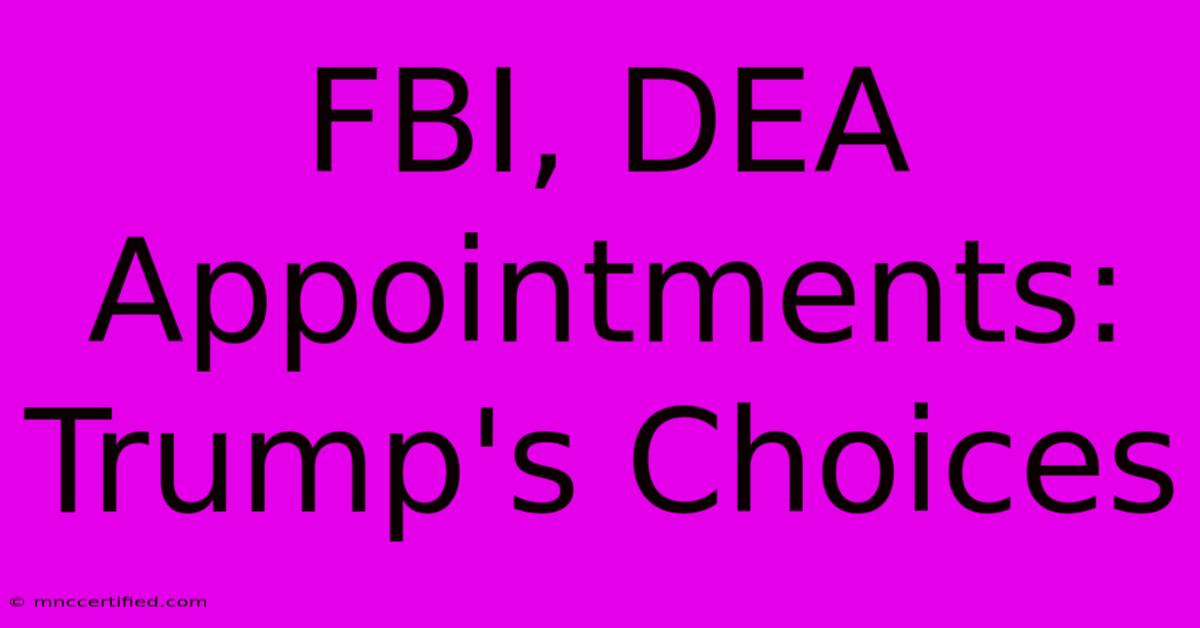FBI, DEA Appointments: Trump's Choices

Table of Contents
FBI, DEA Appointments: Examining Trump's Choices and Their Impact
Donald Trump's presidency saw a significant turnover in key law enforcement positions, including the FBI and DEA. This article examines his appointments to these agencies, analyzing their backgrounds, qualifications, and the potential impact of these choices on the agencies' operations and the broader political landscape. Understanding these appointments is crucial for anyone interested in American politics, law enforcement, and the intricacies of presidential power.
Trump's FBI Directors: A Shift in Leadership
The FBI, tasked with investigating federal crimes, experienced a dramatic shift under Trump's leadership. His initial choice, James Comey, was unexpectedly fired in 2017, a decision that sparked intense controversy and fueled speculation of obstruction of justice. Comey's investigation into Russian interference in the 2016 election and his handling of the Hillary Clinton email investigation were central to this controversy.
Following Comey's dismissal, Christopher Wray was appointed. While Wray had a Republican background, his tenure was marked by a stated commitment to the FBI's independence. However, his leadership was also scrutinized regarding the handling of certain investigations and the agency's response to political pressure. Analyzing Wray's actions and the challenges he faced as director is critical to understanding the complexities of the FBI's role during a politically charged era.
Key Considerations Regarding FBI Appointments:
- Political Affiliation: The stark contrast between Comey's perceived independence and Wray's Republican ties highlights the significant influence of political considerations in these high-profile appointments. Did political affiliation affect investigations and operational decisions?
- Investigative Independence: The firing of Comey raised serious questions about the extent to which the FBI could maintain its independence from political interference. This remains a crucial question for assessing the effectiveness and integrity of the agency.
- Public Trust and Confidence: The controversies surrounding these appointments have undoubtedly affected public trust and confidence in the FBI. Examining the long-term effects on the agency's credibility is vital.
DEA Appointments Under Trump: A Focus on Drug Policy
The Drug Enforcement Administration (DEA), responsible for combating drug trafficking and enforcing drug laws, also experienced changes under Trump's administration. While the shifts may have been less dramatic than those at the FBI, analyzing these appointments offers insights into the administration's approach to drug policy. Understanding the backgrounds and priorities of the appointed DEA administrators is crucial for comprehending shifts in the agency's enforcement strategies and their impact on the nation's drug problem.
Analyzing the Impact of DEA Appointments:
- Drug Policy Priorities: Did the appointed administrators reflect a shift in drug policy priorities, such as a greater focus on certain drugs or a change in enforcement strategies? Examining the data on drug seizures and arrests during this period can provide valuable insights.
- International Cooperation: How did these appointments impact international cooperation in the fight against drug trafficking? Did the changes influence relationships with other countries and international law enforcement agencies?
- Resource Allocation: Did the leadership changes influence resource allocation within the DEA? Were certain areas of enforcement prioritized over others?
Conclusion: Long-Term Implications of Trump's Choices
The appointments to the FBI and DEA under the Trump administration represent a significant case study in the intersection of politics and law enforcement. Analyzing these choices, their impact on agency operations, and their broader implications for American society remains a crucial task for journalists, political scientists, and anyone interested in understanding the dynamics of power and accountability in the US government. The long-term consequences of these appointments on the effectiveness and public perception of these vital agencies are still unfolding and warrant continued scrutiny. Further research into the specific actions and decisions made under each administration is necessary for a complete understanding of this complex issue. This analysis should incorporate data from multiple sources, including official agency reports, news articles, and academic studies.

Thank you for visiting our website wich cover about FBI, DEA Appointments: Trump's Choices. We hope the information provided has been useful to you. Feel free to contact us if you have any questions or need further assistance. See you next time and dont miss to bookmark.
Featured Posts
-
Steelers Big Win Over Bengals
Dec 02, 2024
-
Premier League Liverpool Wins 2 0
Dec 02, 2024
-
Falcons Win Lose Chargers Game Analysis
Dec 02, 2024
-
Nfl Inactives Eagles Vs Ravens
Dec 02, 2024
-
Does Composite Bonding Hurt
Dec 02, 2024